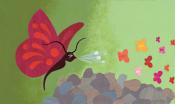article
Seeing Students, Not Threats
My third-period students rushed in at the start of class, wide-eyed and excited. Something had happened. “Quentin hit Ms. Combs!” Helen Combs was my friend. She taught language arts. “He knocked her down,” one student reported. “They took her to the hospital, and the police took him away in handcuffs!”
